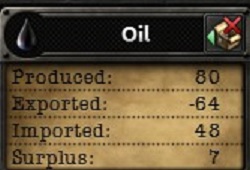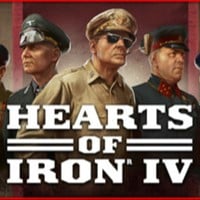Hearts of Iron 4: Trade
Last update:
This one is one of the least developed and comprehensible mechanics in the game. By trading, you can obtain resources that are unavailable to you due to geographical reasons. Of course, there are situations, in which your demand for a certain type of resources exceeds your production capabilities, at which point you have to buy additional amounts. The key for trade are civilian factories and convoys.
If it is possible for you to buy resources from your neighbors, or nations on the same continent, this is where you should go in the first place. After the nearest sources are depleted, you will have to use convoys to buy them from overseas nations. After you have spend enough time with it, trade mechanics are quite intuitive, but it has certain limitations to it. Each transaction allows you to buy or sell, 8 units of a material. Even if you require 4, for example, there is no way for you to go below 8. Each 8 units of a material requires one civilian factory that will process it. The distance between you and your the other party will determine the number of convoys that you will have to use.

Depending on trade policy, a percentage of your produced goods is set aside for trade. This is very important, from the viewpoint of local production. If your own production is low, it does not matter for you if large numbers or a material is in circulation. However, if own production makes the country self-reliant, you can decide to close the market. In such a situation, you lose access to modifiers that will provide you with faster construction of buildings and higher effectiveness of production. However, if your infrastructure is well-developed, you should not worry about that.
The above screenshot presents a fragment of the trade panel concerning oil. The first item always specifies the amount produced by your country. The following items specify the amounts that will be sold on external markets and how much of the material you buy. The last item in the above screenshot specifies your surplus of the resource. What makes this item important is that, in the times of shortage, it specifies the number of units that you need. This is the faster and the most reliable way to verify your trade contracts.
If you play as a nation with few own resources, you should start building convoys as soon as possible. The number of convoys that you use per contract depends on the distance between you and your business partners, which is why you should try and obtain resources from the closest countries. A large number of ships will be especially important, because they also make the basic mode of transport for sea landings. You have to ensure proper backup, to prevent locking yourself off to opportunities.
Also, what is important is the number of civilian factories, thanks to which you can quickly replenish your shortages, without the necessity to wait for factories to be built. The important thing is that you do not start trading at the very beginning of the game. Even if your production lines are not fully stocked, you cannot resign from a part of the factories, up until the moment that you establish proper base. All this depends on your ambitions, and you are supposed to conquer the world. With that in mind, starting to trade, in the face of the fact that you only have 10 factories, may soon bring about your failure. Unfortunately, you cannot say whether other nations actually buy the goods that you allotted to trade. In the case of a trading agreement, the contract that you conclude alleviates the incurred costs.
What is especially useful while selecting your business partners, is the filter incorporated into the panel. Thanks to the available options, you can find specific materials that are sold by your neighbors, or within the continent.
Trading agreements aid diplomatic relations, because many countries favor those of the nations that they trade with. Also, it is important that in the case of war with a business partner, all of the trade routes are closed. You have to remember about that, especially when you suffer from severe shortages in your gear and you prepare to wage war against the key importer of your materials.
You are not permitted to copy any image, text or info from this page. This site is not associated with and/or endorsed by the developers and the publishers. All logos and images are copyrighted by their respective owners.
Copyright © 2000 - 2026 Webedia Polska SA for gamepressure.com, unofficial game guides, walkthroughs, secrets, game tips, maps & strategies for top games.
